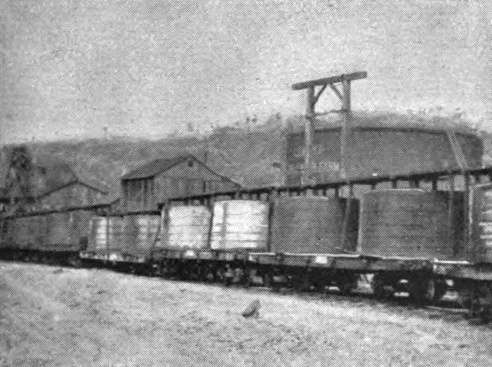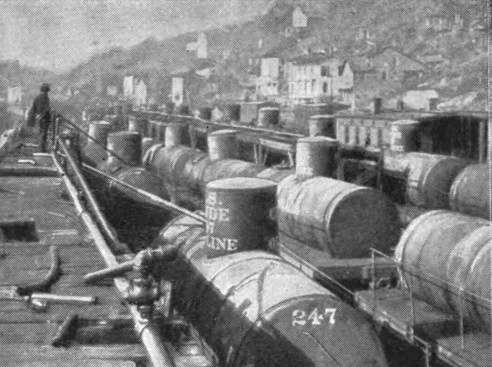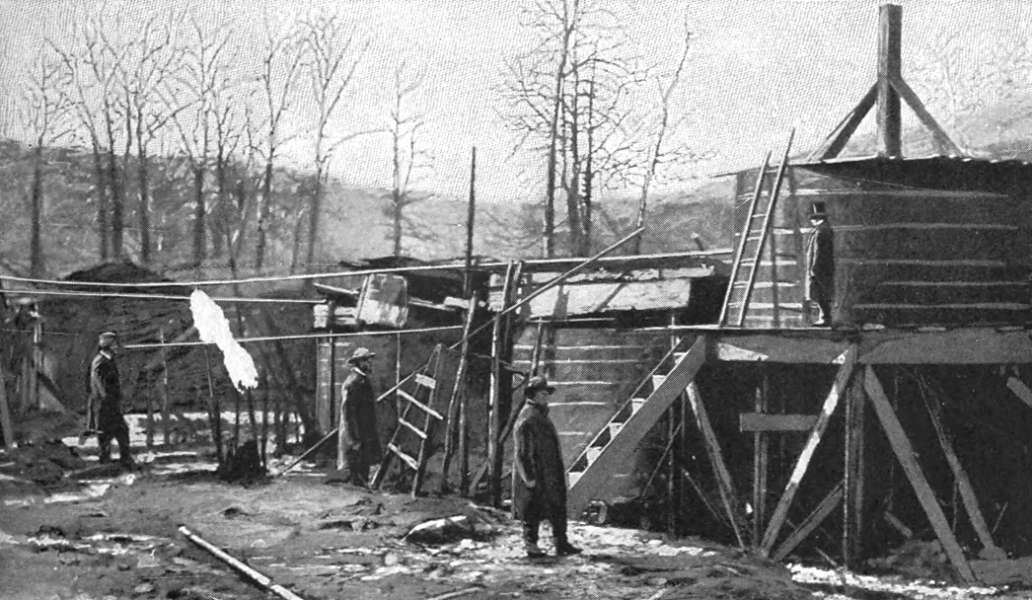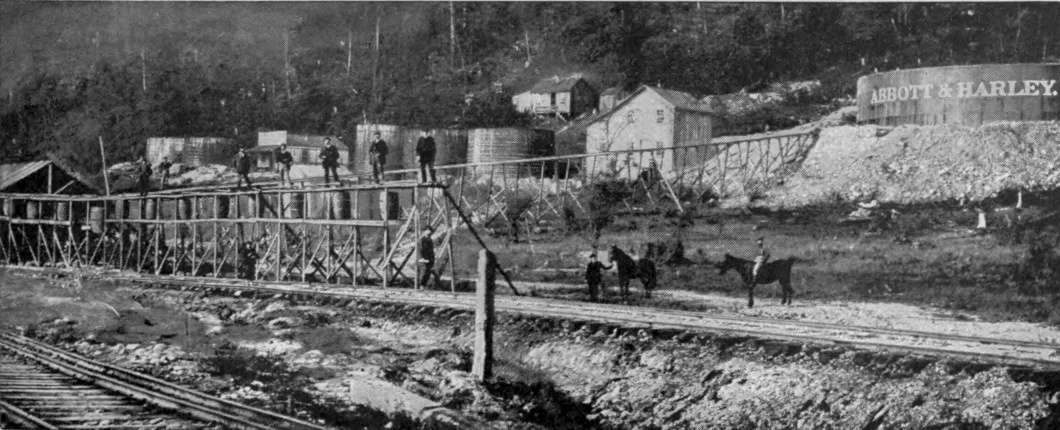

A RISE IN OIL — A BLOCKADE IN EXPORTS — PRODUCERS DO NOT GET THEIR SHARE OF THE PROFITS — THEY SECRETLY ORGANISE THE PETROLEUM PRODUCERS' UNION AND PROMISE TO SUPPORT PROPOSED INDEPENDENT PIPE-LINES — ANOTHER INTERSTATE COMMERCE BILL DEFEATED AT WASHINGTON — "IMMEDIATE SHIPMENT" — INDEPENDENTS HAVE TROUBLE GETTING CARS — RIOTS THREATENED — APPEAL TO GOVERNOR HARTRANFT — SUITS BROUGHT AGAINST UNITED PIPE-LINES, PENNSYLVANIA RAILROAD AND OTHERS — INVESTIGATIONS PRECIPITATED IN OTHER STATES — THE HEPBURN COMMISSION AND THE OHIO INVESTIGATION — EVIDENCE THAT THE STANDARD IS A CONTINUATION OF THE SOUTH IMPROVEMENT COMPANY — PRODUCERS FINALLY DECIDE TO PROCEED AGAINST STANDARD OFFICIALS — ROCKEFELLER AND EIGHT OF HIS ASSOCIATES INDICTED FOR CONSPIRACY.
IT was clear enough by the opening of 1878 that Mr. Rockefeller need no longer fear any serious trouble from the refining element. To be sure there were scattered concerns still holding out and some of them doing very well; but his latest move had put him in a position to cut off or at least seriously to interfere with the very raw material in which they worked. It was hardly to be expected after the defeat of the Pennsylvania that any railroad would be rash enough to combine with even a strong group of refiners. As for independent pipe-lines, there were so many ways of "discouraging" their building that it did not seem probable that any one would ever go far. It was only a matter of time, then, when all remaining outside refiners must come into his fold or die. Mr. Rockefeller's path would now have been smooth had it not been for the oil producers. But the oil producers, naturally his enemy, he being the buyer and they the seller, had become in the six years before Mr. Rockefeller had made himself the only gatherer of their oil, irreconcilable opponents of whatever he might do. The South Improvement Company they regarded rightly enough as devised to control the price of their product, and that scheme they wrongfully laid entirely at Mr. Rockefeller's door. Mr. Rockefeller had been only one of the originators of the South Improvement Company, but the fact that he had become later practically its only supporter, that he was the only one who had profited by it, and that he had turned his Cleveland plant into a machine for carrying out its provisions, had caused the oil country to fix on him the entire responsibility. Then the oil men's experience with Mr. Rockefeller in 1873 had been unfortunate. They charged the failure of their alliance to his duplicity. There is no doubt that Mr. Rockefeller played a shrewd and false game with the oil men in 1873, but the failure of their alliance was their own fault. They did not hold together — they failed to limit their production as they agreed, they suspected one another, and at a moment, when, if they had been as patient and wise as their great opponent they would have had the game in their own hands, and him at their feet, as he had been in 1872, for the sake of immediate returns, they abandoned some of the best features of their organisation, and allied themselves with a man they distrusted. When that alliance failed they threw on Mr. Rockefeller's shoulders a blame which they should have taken on their own.
Another very real cause for their anxiety and dislike was that as the refiners' alliance progressed the refiners made a much larger share of the profits than the producers thought fair. The abandoning of their alliance in 1873 had of course put an end to their measures for limiting production and for holding over-production until it could be sold at the prices they thought profitable. The drill had gone on merrily through 1873, 1874, and 1875, regardless of consumption or prices. By the end of 1874 there were over three and a half million barrels of oil in stock, more than twice what there had ever been before. Production was well to a million barrels a month and prices that year averaged but $1.15 a barrel. For men who considered three dollars a starvation price this was indeed hard luck. Things looked better by the end of 1875, for production was falling off. By March, 1876, stocks had been so reduced that there was strong confidence that the price of crude oil must advance. By June the Oil City Derrick began to prophesy "three-dollar oil" and to advise oil men to hold crude for that price. In August three dollars was reached in the Oil City exchange. It had been nearly four years since that price had been paid for oil, and the day the point was reached (August 25) the brokers fairly went mad. They jumped on their chairs, threw up their hats, beat one another on the back, while the spectators in the crowded galleries, most of them speculators, yelled in sympathy. Before six o'clock that day oil reached $3.11-1/4. Nobody thought of stopping because it was supper time. The exchange was open until nearly midnight, prices booming on to $3.17-1/2. It seemed like old times in the Oil Region — the good old flush times when people made a fortune one day and threw it away the next!
Of course refined oil went up steadily with crude. Refined reached 21-3/8 cents in New York the day of this boom at Oil City. The day following the rise was one of the most exciting the oil exchange had ever seen. "Never before," declared the Derrick in its report, "was so much business done. From early in the morning until ten o'clock at night the exchange was crowded by frantic speculators. Their awful excitement was clear from their blanched faces and wild voices. Fully 800,000 barrels of oil exchanged hands that day, the advance between the time the exchange opened and its close was over fifty-five cents. Refined in New York advanced in accordance with the market on the creek, closing at twenty-four cents. This went on for several days, when a new element in the situation began to force itself on the oil men's attention. One of the chief reasons on which they based their confidence in high prices for crude oil was the fact that the foreigners were short of refined oil. It was the custom then, as now, for exporters to buy their oil for the winter European trade in the late summer and early fall. When the boom began the harbour at New York was beginning to fill up with ships for cargoes. But to the consternation of the oil men intent on keeping up the boom, the exporters were refusing to buy. They were declaring the price to which refined had risen to be out of proportion to the price of crude. More, they declared the latter a speculative price — only once, they argued, had it touched four dollars, and the refiners were not buying at that price for manufacture. They were holding refined too high. It was early in September when the realisation came upon the Oil Regions that a new element was in the problem — a veritable blockade in exports. As the days went on they saw that this was no temporary affair. They saw that Mr. Rockefeller's combination was at last carrying out just what it had been organised to do — forcing the price it wanted for refined. Day after day refined was held at twenty-six cents. Day after day the exporters refused to buy. It was not until the end of September, in fact, that they began to yield — as it was inevitable they should do, for the game was certainly in the hands of the refiners, and Europe had to have its light. The exporters began to see too that if they held off longer they might have to pay higher prices, for it was rumoured that the Standard Combination was shutting down its factories, literally making refined scarce, while crude oil was piling up in Pennsylvania!
With the yielding of the exporter exactly what they feared occurred, the price was raised! The exporters balked again. The matter began to attract public attention. The New York Herald was particularly active in airing the situation and did not hesitate to denounce it as a "Petroleum Plot." The leaders were interviewed, among them Mr. Rockefeller. Mr. Rockefeller still held to his theory that to make oil dear was worthy of public approval. They had aimed to control the price of oil in a perfectly legitimate way, he told the Herald reporter, and the exporters would have to yield to their prices. By the end of October New York harbour was full of vessels — a mute protest against the corner — and it was not until November that the exporters fully gave in and began to take all the oil they could get at prices asked, which ranged from twenty-six to thirty-five cents. And these prices were held all through the winter of 1876-77, up to February 22. They were held regardless of the price of crude, for, do their utmost, the producers could not keep their oil up to the corresponding price of refined. According to the scale of relative prices then accepted, twenty-six cents a gallon for refined meant five dollars a barrel for crude, yet there was not a month in the entire period of this hold-up that crude averaged that price. In December, when the average price of refined was 29-3/8 cents, crude was but $3.78-1/8 a barrel. The producers held meetings and passed resolutions, cursed the refiners and talked of building independent refineries, filled the columns of the Derrick with open letters advocating a shut-down, an alliance of their own, restrictive legislation, an oil men's railway, and what was more to the point some of them supported, with more or less fidelity, the efforts to build up counter movements noted in the last chapter: the Columbia Conduit Line, the seaboard pipe-line, and especially the alliance with the Empire Transportation Company, attempted in the spring of 1877. There seemed more hope in this last combination than in any other movement, for they had faith in Colonel Potts, and besides they were accustomed to seeing the Pennsylvania Railroad get what it wanted. The defeat of the Pennsylvania was therefore the heavier blow. Indeed, the news of the sale of the Empire pipe-lines to the Standard was like the sounding of the tocsin in the angry and baffled Oil Regions. It revived the spirit of 1872. But it was the spirit of 1872 with new dignity and a discretion such as had never been before seen in the blatant region. In every town from McKean County southwest to Butler the oil towns hastened to organise themselves into a secret society. Little by little it came out that a Producers' Union had been organised. From all that could be learned it looked very much as if the Petroleum Producers' Union had come into existence to do business. On November 21, 1877, the first meeting of the new organisation was held, "the Petroleum Parliament" or "Congress" it was called. This Congress, which met in Titusville, was composed of 172 delegates. It was claimed that it represented at least 2,000 oil producers, and not less than seventy-five millions in money. It is certain it included the representative men of the Oil Regions, those to whose daring, hard work, and energy the discovery and development of the oil fields, as they were known at that time, were entirely due.




For four days the Congress was in session, and it is a remarkable comment on the seriousness with which it had undertaken its work that, although reporters from all parts of the country interested in oil were present, nothing leaked out. In December a second session of four days was held in Titusville, but no announcement of what was doing was made to the press. Indeed, it was only as lines of action developed that the public became familiar with what the producers had resolved on in the days of secret session which they had held.
 |
Table of Contents |  |